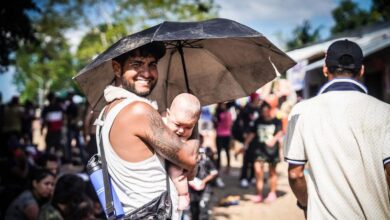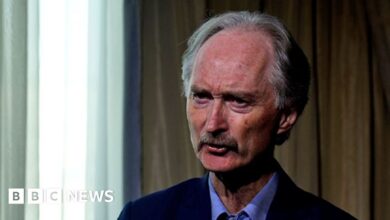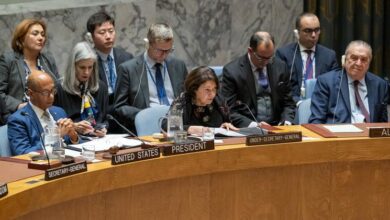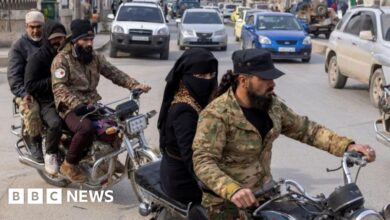The report said anti-Assad rebels had taken over much of Syria’s southern Deraa region
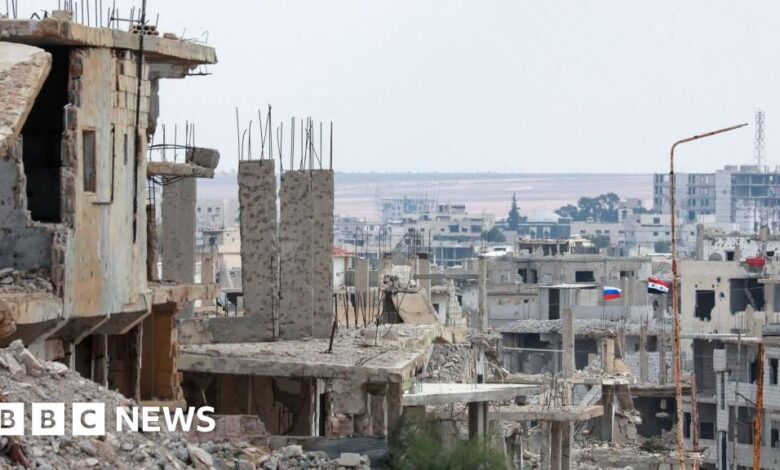
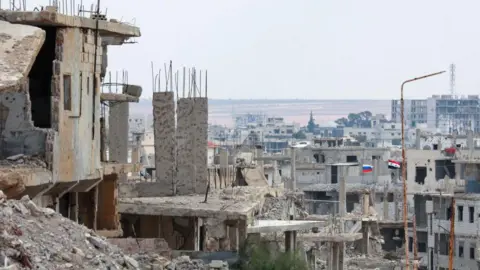 AFP
AFPRebels in southern Syria are believed to have captured much of the Deraa region – the birthplace of the 2011 uprising against President Bashar al-Assad.
A UK-based war monitoring agency reported that “local factions” were able to take control of many military sites there after “violent battles” with government forces.
According to Reuters news agency, rebel sources said they had reached an agreement for the army to withdraw and military officials to be given safe passage to the capital Damascus – about 100 km away.
Meanwhile in the north, the Syrian army said it was conducting air strikes around Homs, trying to push back rebels who had advanced to the edge of the strategic city.
Reports from a war monitoring agency said Syrian forces had withdrawn to towns just 10km (6.2 miles) from Damascus, although this was denied by the army and the BBC could not verify.
The Syrian Observatory for Human Rights (SOHR), a Britain-based war monitor, said on Friday that rebels in the south controlled more than 90% of the Deraa region and only the Sanamayn region remained in its hands. government.
The city of Deraa has both strategic and symbolic importance. It is the capital of the province and close to the main crossings on the Jordanian border, and is also where pro-democracy protests erupted in 2011 – sparking the country’s ongoing civil war, in More than half a million people died.
Jordan’s interior minister said the country had closed its border due to “surrounding security conditions in southern Syria”.
Along with the US and UK, Jordan also called on its citizens to leave Syria as soon as possible.
Meanwhile, government officials in the city of Suweida – about 50km east of Deraa – are said to have left the city following clashes between security forces and militias belonging to the minority Druze sect. , make up the majority in the region.
Ryan Marouf, an activist and editor of the news website Suwayda 24, told Reuters that “people are seeing what is happening in the rest of Syria as the liberation of Syria and an opportunity to overthrow the regime”.
Elsewhere, Kurdish-led forces said they had captured the city of Deir Ezzor, the government’s main stronghold in the vast desert in the east of the country.
And in the north, the main rebel offensive has reached the outskirts of the strategic city of Homs. The Syrian army and its Russian allies are fighting back with airstrikes that killed 20 civilians on the city’s outskirts on Friday.
And most importantly, officials quoted by the New York Times said that President Assad’s other important ally, Iran, has begun evacuating its military commanders and personnel.
It has been more than a week since rebels in the north launched a blitzkrieg – the biggest attack on the Syrian government in years, exposing the weakness of the country’s military.
At least 370,000 people are believed to have been displaced by the rebel attack, according to the United Nations, which said the fighting also “exacerbated an already terrible situation for civilians in the north of the country”. should be worse”.
Some civilians trapped in frontline areas were unable to reach safer locations.
SOHR said more than 820 people, including 111 civilians, have been killed across the country since Islamist-led rebels began their offensive last week.
Surname seized Hama, north of Homs, on Thursday – the second major blow to President Assad, who lost control of Aleppo last week.
The leader of the Islamist rebel group Hayat Tahrir al-Sham (HTS), Abu Mohammed al-Jawlani, told the people of Homs that “your time has come”.
The rebels are moving south and Homs will be the next stop on the road to Damascus.

Terrified members of President Assad’s Alawite minority are rushing out of Homs, with video showing roads clogged with cars.
“Our forces have liberated the last village on the outskirts of Homs city and are now on its walls,” the Syrian faction leading the attack said on Telegram.
The BBC has not been able to verify these moves, but SOHR previously reported that rebels were several kilometers from the city.
SOHR said Russian warplanes bombed a bridge in nearby Rastan to try to slow the rebel advance.
After the Syrian army lost control of Hama after days of fighting, it was unclear whether they could defend Homs.
The Defense Ministry has denied claims that it has withdrawn troops from the strategic city, which links the capital Damascus with the Alawite heartland on the Mediterranean coast.
The Alawites are a minority sect of Shia Muslims from whom the Assad family originates.
They have long formed a major support base for Assad’s rule and are key to the president’s hold on power.
Assad vowed to “crush” the rebels and accused Western powers of trying to redraw the map of the region.
But analysts say The forces were demoralized, facing low pay and corruption within the ranks. He State news agency Sana announced a 50% salary increase in recent days.
Russia and Iran, the regime’s most important allies, have announced their continued support for Assad,
But they have not provided the kind of military support so far to consolidate his rule, and Moscow is now calling on Russian citizens to leave the country.
The US on Friday also advised its citizens to leave Syria “while commercial options remain available in Damascus”.
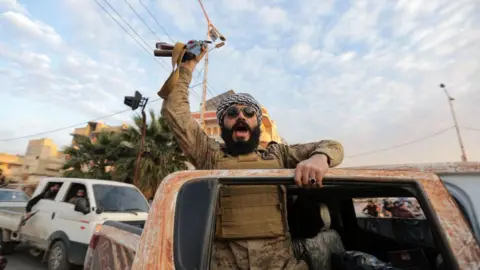 Getty Images
Getty ImagesThe Kremlin is preoccupied with the war in Ukraine, and Iran has been weakened by Israel’s sanctions campaign against its most powerful allied militia, Lebanon’s Hezbollah.
Hezbollah, which is a key fighting force in the regime’s territorial hold in Syria, is now largely absent from the battlefield, although Lebanese and Israeli press reports say a small number have crossed the border to increase their presence. strengthen defense for Homs.
Russian and Iranian officials are expected to meet their Turkish counterparts over the weekend to discuss their response to the outbreak of the civil war in Syria.
Türkiye backs several rebel groups and President Recep Tayyip Erdogan has for months pressed Assad to reach a political settlement with the opposition.
He has voiced support for the rebels’ recent advances and said the attack would not have happened if Assad had responded to his calls.
Analysts say that almost certainly could not have happened without Ankara’s knowledge and approval.
For his part, HTS leader Abu Mohammed al-Jawlani has made public comments aimed at softening his image and reassuring both Syrians and foreign leaders.
Years ago, he emphasized separation from Islamic State and Al Qaeda, portrayed himself as a nationalist who opposed attacks outside Syria and promised to protect minorities.
In an interview with CNN, al-Jawlani said the rebels’ goal is to overthrow the Assad regime and establish a government that represents all Syrians.
Earlier, HTS fighters and their allies occupied Hama and released prisoners from the central prison amid fierce fighting, while the military said it had redeployed troops outside the city. street.
Hama is home to a million people and is 110km south of Aleppo, which rebels captured last week.
In Aleppo, a city of two million people, a number of important public services and facilities – including hospitals, bakeries, power plants, water, internet and telecommunications – were interrupted or not functioning because of lack of materials and personnel.
UN Secretary-General Antonio Guterres called on “all those with influence to do their part” to end the civil war.
With additional reporting by Maia Davies


